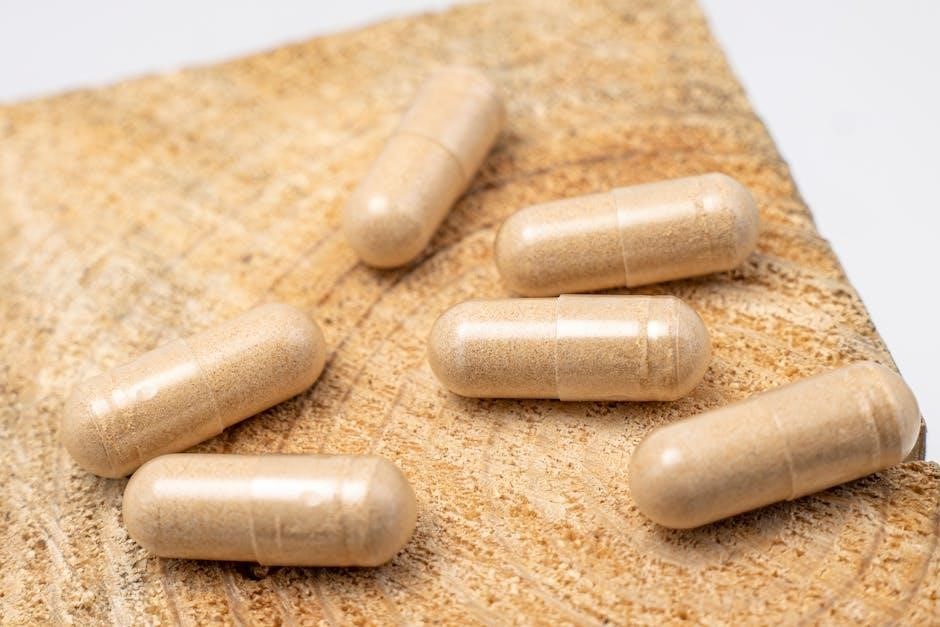Herbal tablets are dietary supplements made from concentrated plant extracts, offering natural health benefits. They are popular for their holistic approach to wellness, combining traditional herbs with modern technology.
Overview of Herbal Tablets
Herbal tablets are natural supplements made from plant extracts, designed to promote health and wellness. They are popularity due to their convenience and concentrated form. These tablets often combine multiple herbs to enhance efficacy. They are used for various purposes, including boosting energy, improving digestion, and supporting immune function. Herbal tablets are a modern adaptation of traditional herbal remedies, offering a standardized and easy-to-consume option for health-conscious individuals.
Benefits of Herbal Tablets
Herbal tablets offer natural health benefits, supporting immune function, mental well-being, and anti-inflammatory responses. They provide a holistic approach to wellness, combining traditional herbs with modern science.
Immune System Support
Herbal tablets contain antioxidants and vitamins that enhance immune function, reducing illness risk. Ingredients like echinacea and ginseng boost white blood cell activity, strengthening the body’s natural defenses. Regular use promotes long-term immune health, making them a popular choice for preventive care;
Mental Health Benefits
Herbal tablets may support mental health by reducing stress and anxiety. Ingredients like ashwagandha and St. John’s Wort help alleviate symptoms of depression and promote relaxation. They can also improve sleep quality, enhancing overall mental well-being. These natural remedies offer a gentle alternative to synthetic medications, fostering emotional balance and cognitive clarity.
Anti-Inflammatory Properties
Herbal tablets often contain ingredients like turmeric, ginger, and boswellia, known for their anti-inflammatory effects. These natural compounds can reduce inflammation by modulating enzymes and pathways in the body. Regular use may help alleviate conditions such as arthritis, joint pain, and chronic inflammation. They offer a natural alternative to synthetic anti-inflammatory drugs, promoting long-term health without harsh side effects.

Safety and Precautions
Herbal tablets are generally safe when used as directed, but precautions are essential. Consult a healthcare provider before use, especially for pregnant individuals or those on medication.
Interactions with Medications
Herbal tablets can interact with medications, altering their effectiveness or causing adverse effects. Certain herbs may enhance or inhibit drug metabolism, particularly for blood thinners, diabetes medications, and blood pressure drugs. Always consult a healthcare provider before combining herbal supplements with prescription medications to avoid potential risks and ensure safe usage.
Possible Side Effects
Herbal tablets may cause side effects, including allergic reactions, stomach upset, or dizziness. Certain herbs can trigger skin rashes or interact with underlying allergies. While generally safe, excessive consumption may lead to gastrointestinal discomfort or headaches. Users should adhere to recommended dosages and consult a healthcare provider, especially if pregnant, breastfeeding, or managing chronic conditions.
Choosing the Right Herbal Tablets
Selecting herbal tablets involves considering health goals, ingredient quality, and brand reputation. Always read labels, ensure third-party testing, and consult professionals for personalized recommendations.
Factors to Consider
When selecting herbal tablets, consider the purpose, such as immune support or mental health. Check the ingredient list for potency and purity. Ensure the product is free from harmful additives and follows Good Manufacturing Practices (GMP). Look for third-party certifications like NSF International or ConsumerLab. Also, evaluate the brand’s reputation, read user reviews, and consult healthcare professionals to ensure safety and efficacy.
Quality and Brand Reputation
Quality and brand reputation are crucial when choosing herbal tablets. Opt for products from reputable manufacturers with third-party certifications like NSF International or ConsumerLab. Ensure transparency in sourcing and testing. Check user reviews and expert endorsements. A trustworthy brand adheres to Good Manufacturing Practices (GMP) and provides clear labeling. Consult healthcare professionals to confirm efficacy and safety, ensuring the product meets your health needs.

The Manufacturing Process
Herbal tablets are made through extraction, purification, and formulation of plant extracts, ensuring potency and safety. Quality control measures guarantee adherence to regulatory standards and efficacy.
Raw Material Sourcing
High-quality herbs are sourced from organic farms or wildcrafted in their natural habitats to ensure optimal potency. Suppliers adhere to strict quality control measures, including testing for purity, contaminants, and bioactive compounds. Sustainability practices are prioritized to maintain ecological balance and ensure long-term availability. Rigorous audits and certifications guarantee compliance with global standards, making raw material sourcing a critical step in herbal tablet production.
Production Techniques
Herbal tablets are manufactured using advanced extraction and processing methods. Raw herbs undergo milling, extraction, and standardization to ensure consistent bioactive compound levels. The mixture is then granulated, compressed into tablets, or encapsulated. Quality control measures, including purity testing and potency verification, are implemented at each stage. Modern production techniques ensure the final product is safe, effective, and meets regulatory standards for consumer use.

Current Research and Studies
Recent studies highlight the efficacy of herbal tablets in supporting immune function and mental health. Ongoing research explores their anti-inflammatory properties and safety profiles.
Scientific Evidence
Clinical trials validate the effectiveness of herbal tablets, with studies showcasing their potential in immune support and mental health. Pharmacokinetic research demonstrates bioavailability and absorption rates, ensuring efficacy. These findings underscore the role of herbal tablets in complementary medicine, supported by rigorous scientific testing and quality assurance protocols;
Ongoing Studies
Current research focuses on enhancing herbal tablet formulations and exploring new therapeutic applications. Studies investigate optimal dosages, synergistic herb combinations, and long-term effects. Emerging data highlights potential breakthroughs in chronic disease management and mental health support, ensuring herbal tablets remain at the forefront of natural health innovation and scientific advancement.
Legal and Regulatory Status
Herbal tablets are regulated by various global authorities, ensuring safety and efficacy. Regulatory bodies enforce strict guidelines, while laws vary by region, impacting their classification and distribution.
Regulatory Bodies
Regulatory bodies like the FDA and EMA oversee herbal tablets, ensuring compliance with safety standards. These agencies evaluate ingredients, manufacturing processes, and labeling. They enforce strict guidelines to protect consumer health, requiring evidence of safety and efficacy. Compliance with these regulations is mandatory for market approval, fostering trust and accountability in the industry.
Global Regulations
Global regulations for herbal tablets vary by country, with the EU, US, and Australia having distinct frameworks. The European Union regulates under the Traditional Herbal Medicinal Products Directive (THMPD), while the US FDA oversees dietary supplements. Australia uses the Therapeutic Goods Administration (TGA) to ensure safety and efficacy. These regulations aim to standardize quality, safety, and labeling, providing consumers with reliable products across borders.

User Experiences and Reviews
Users often report positive experiences with herbal tablets, citing improved well-being and convenience. Many appreciate their natural ingredients and perceived safety compared to synthetic alternatives.
Testimonials
Many users share positive testimonials about herbal tablets, highlighting their effectiveness in improving overall well-being. Customers often report enhanced energy levels, better digestion, and reduced stress. Some describe them as “life-changing,” while others appreciate their natural, chemical-free composition. Feedback frequently emphasizes convenience and satisfaction with results, making herbal tablets a popular choice for those seeking holistic health solutions.
Feedback Analysis
Feedback analysis reveals that users generally appreciate the convenience and effectiveness of herbal tablets. Many report improved health outcomes, with common praises for their natural ingredients and ease of use. Some users highlight mild side effects or taste issues, but overall satisfaction remains high. Recurring themes include enhanced well-being and trust in herbal solutions, reflecting positive consumer experiences and loyalty to such products.
Comparison with Traditional Medicine
Herbal tablets offer a natural alternative to synthetic drugs, often with fewer side effects. They align with traditional medicine’s holistic approach but are more accessible and convenient for modern users.
Efficacy Comparison
Herbal tablets often demonstrate similar efficacy to traditional medications for certain conditions, such as digestive issues or mild anxiety. However, their effectiveness can vary due to differences in potency and standardization. Some studies suggest herbal remedies may offer long-term benefits with fewer side effects, though more research is needed to confirm their reliability across diverse health concerns;
Cost-Effectiveness
Herbal tablets are generally more affordable than prescription medications, making them a cost-effective option for many consumers. Their natural ingredients often result in lower production costs, which are passed on to buyers. Additionally, herbal remedies can be used for extended periods without significant expense, enhancing their value for long-term health management.
Future Trends
Technological advancements and increasing consumer demand for natural health solutions are driving the growth of herbal tablets, with a focus on sustainability and innovative formulations.
Technological Advancements
Advancements in extraction techniques, nanotechnology, and AI-driven formulations are revolutionizing herbal tablet production, enhancing bioavailability and efficacy. Automation in manufacturing ensures consistency, while innovations in coating technologies improve shelf life and patient compliance. These advancements are paving the way for more effective, standardized, and sustainable herbal products, catering to the growing demand for natural health solutions globally.
Market Growth
The global herbal tablets market is experiencing significant growth due to rising consumer demand for natural health products. Increasing awareness of wellness and preventive healthcare is driving this trend; The market is projected to expand further, supported by advancements in technology and regulatory approvals. Emerging markets and digital platforms are also fueling accessibility and sales, making herbal tablets a rapidly growing sector in the health industry.